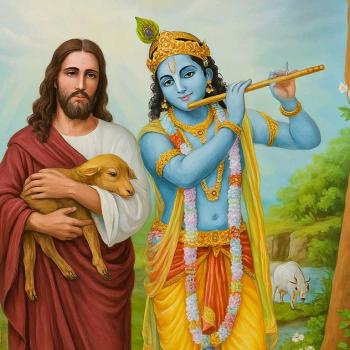So why remain categorized in a box that disgusts you because of the views it holds? Do people think that disassociating with a large, encompassing, religious institution will save them from the need to explain their beliefs to strangers so as not to offend or be misconstrued? These are critical questions to ask of those leaving institutionalized religion.
I agree with St. Marie Lewis that Miller writes as if he wants the world to be black-and-white, and I find his call for people to self-identify as over-looking the institutional problems potentially causing people to be "spiritual, but not religious." Nonetheless, the "me" generation seems to have forgotten how to belong. If we do not like an idea or a person it's fine, because we will move on to another, possibly better group. Our consumption habits have entered our personal interactions and we forget that belonging means taking the good with the bad.
A community, whatever the common factor of the group, is like a family. There will be people you do not like and times that are rough, but you cannot run away or escape no matter how hard you try. You may find another "family," but they will also have their issues and are you going to leave them, too? My use of family as a metaphor is not intended to reiterate Miller's call for identification, but to point out there is a commitment that comes with joining a community. There will always be a negative or a divergent opinion, but that does not always qualify as a reason to abandon an identity or group.
Despite my beliefs in a monotheistic greater power that I call by a variety of names (God, Fate, Destiny, and Sophia when I want to be nerdy, etc.), I strongly believe that religious affiliation is a commitment and not something that should be made for you. (I do recognize that this is a very Western and contemporary view of religious identity.) So I ask, what about those of us who have a fear of commitment? What about those of us who have decided that the religion we were born into is not the religious identity to which we want to commit? In such cases, Miller's statement, "being spiritual but not religious avoids having to think too hard about having to decide," is completely off base.
We have thought very hard and we have decided. I have thought about what religious community I would like to commit to and have come close to choosing. But I take the commitment seriously and recognize that I am not entirely ready. It would be unfair to the community, the religious institution, and myself to commit to a religion only to pick-and-choose what I want to be. It is not an all-or-nothing situation, especially when it comes to hierarchical institutions that hand down rulings and views, but committing does require a strong belief in not only the theology, but that the institution is good and has the potential to right its wrongs.
Until I can commit, I accept my place on the outside. Call me "spiritual, but not religious," agnostic, or a None, but do not think that my choice to be unaffiliated is a cop-out. I have spent years struggling with my religious identity and know I am not alone. Perhaps I will never be done wrestling with my beliefs long enough to commit to a religious community, but at least I can proudly say I am not taking the easy way out. I may be a part of the "me" generation, but my religious identity is not my own. It is an identity that belongs to the community with which I affiliate, so until I can commit to the group's identity I will remain "spiritual" in my unaffiliated way.




